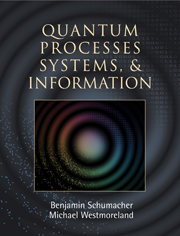Book contents
- Frontmatter
- Contents
- Preface
- 1 Bits and quanta
- 2 Qubits
- 3 States and observables
- 4 Distinguishability and information
- 5 Quantum dynamics
- 6 Entanglement
- 7 Information and ebits
- 8 Density operators
- 9 Open systems
- 10 A particle in space
- 11 Dynamics of a free particle
- 12 Spin and rotation
- 13 Ladder systems
- 14 Many particles
- 15 Stationary states in 1-D
- 16 Bound states in 3-D
- 17 Perturbation theory
- 18 Quantum information processing
- 19 Classical and quantum entropy
- 20 Error correction
- Appendix A Probability
- Appendix B Fourier facts
- Appendix C Gaussian functions
- Appendix D Generalized evolution
- Index
Appendix B - Fourier facts
Published online by Cambridge University Press: 05 June 2012
- Frontmatter
- Contents
- Preface
- 1 Bits and quanta
- 2 Qubits
- 3 States and observables
- 4 Distinguishability and information
- 5 Quantum dynamics
- 6 Entanglement
- 7 Information and ebits
- 8 Density operators
- 9 Open systems
- 10 A particle in space
- 11 Dynamics of a free particle
- 12 Spin and rotation
- 13 Ladder systems
- 14 Many particles
- 15 Stationary states in 1-D
- 16 Bound states in 3-D
- 17 Perturbation theory
- 18 Quantum information processing
- 19 Classical and quantum entropy
- 20 Error correction
- Appendix A Probability
- Appendix B Fourier facts
- Appendix C Gaussian functions
- Appendix D Generalized evolution
- Index
Summary
The delta function
… [E]ven the most precise sciences normally work with more or less ill-understood approximations toward which the scientist must maintain an appropriate skepticism …. The physicist rightly dreads precise argument, since an argument which is only convincing if precise loses all its force if the assumptions upon which it is based are slightly changed, while an argument which is convincing though imprecise may well be stable under small perturbations of its underlying axioms.
(Jack Schwartz, The Pernicious Influence of Mathematics on Science)In this appendix, we review some techniques of mathematical physics. We present the mathematics in “physics style” – that is, with apparent disregard for the mathematical niceties. We will use “functions” whose properties cannot be matched by any actual function. We will exchange the order of limit operations by commuting integrals, derivatives, and infinite sums, all without any apparent consideration of the deep analytical issues involved. If the math police gave out tickets for reckless deriving, we would probably get one.
Why risk it? Often, the “reckless” derivation is a useful shorthand for a more sophisticated (and rigorous) chain of mathematical reasoning. An ironclad proof of a result may have to deal with many technical issues that, though necessary to close all of the logical loopholes, act to obscure the central ideas. The less formal approach is therefore both briefer and more revealing.
Information
- Type
- Chapter
- Information
- Quantum Processes Systems, and Information , pp. 444 - 450Publisher: Cambridge University PressPrint publication year: 2010
